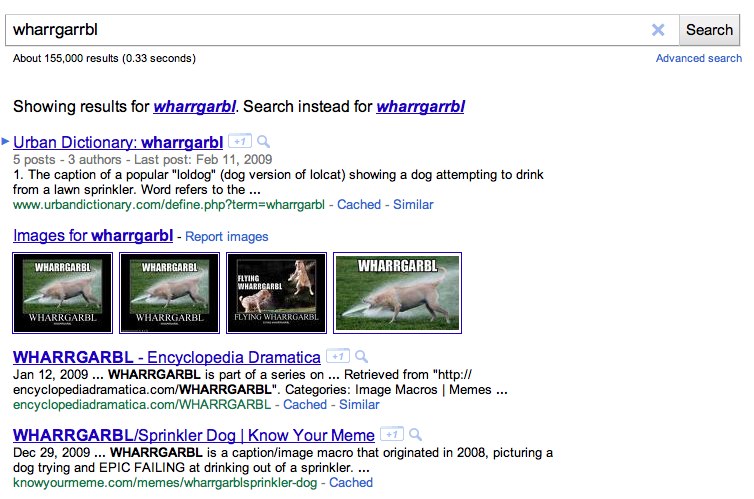This is a great search results page, for more than one reason:
Tag: search
- Example of the Biblical story
- Curse of the languages – that people could no longer cooperate
- Three lessons
- Don’t mess with God
- Cooperation
- How do we identify that apples are apples and oranges are oranges?
- We put our experiences together in order to distinguish the two things
- Context
- The “database of things” around our experiences
- What happens when we don’t agree?
- We crash Martian orbiters
- What about a computer?
- When a computer encounters a piece of data, it has no context
- Is the number 20 an hour, a number, the result of an algorithm?
- Can’t computers use HTML as a sort of a database to provide context for all the things they look at?
- No; HTML was designed for humans to understand; not for computers
- People understand relationships between data; computers don’t unless we tell them
- How do we get computers to understand and give them context?
- How do you explain the semantic web and semantic technologies?
- Tagging important data with a context and a vocabulary
- Humans frequently don’t speak the same language at all
- We have different preconceptions and different filters
- We have to build ontologies, vocabularies, and tag everything and connect it to the semantic database so computers can understand it
- If you are running predictive analysis on a whole bunch of data, you can use semantic analysis to unify datasets from very distant places and use it to understand what’s predictive
- Potential application: healthcare and science
- Semantic data makes the data highly valuable, because it allows other groups to “piggyback” on work that is being done without needing a “translation” of the work
- Any company can define their own ontology, but if we let a company control them, it becomes hard to use them
- Publishing and Web apps
- What if we started tagging news semantically so a computer can understand the relationships?
- Starts with making pure browsing, search, and discovery better
- MS Pivot as an example of data that is semantically tagged
- Public health
- What if we semantically tagged symptoms for everything across the country?
- Could identify the patterns related to disease and illness outbreak
- AI
- Semantics is the foundation for very robust AI
- This is why computers can’t respond to stimuli the same way we do
- Example – have people watch something and take semantic data of the emotional response – use those curves to model relationship in a computer
- Companies using – Merck, Biogen Idec, GroupM, Chevron
- Projects
- DBPedia – structured data from Wikipedia
- GoodRelations – product information, etc.
- Swoogle – semantic resource search engine
- Cambridge Semantics – enabled spreadsheets used by Group M
- Pivot
- What does this all add up to?
- A better understanding of our world and the patterns that drive it
- Accelerated convergence of industries
- Accelerated innovation and discovery
Well, actually, Google is all about the advertising, but that’s another article.
From the Twitter blog:
We went back to the original sketch and made everything far more awesome. Currently, a small subset of Twitter users are trying this new search feature in the sidebar of their Twitter home page. When you do a search, you don’t go to another page, the relevant tweets instantly show up where you’d expect them to—right on your home page where tweets love to be.
Take a look at the whole article. It’s awesome to see the design process boiled down to a simple sketch on a legal pad. Sometimes, the best ideas have very simple beginnings.
For some reason, in the past 24 hours or so, I’ve had more search hits on the term “confirmation@apple.com” or “confirmation@apple.com email” than I’ve seen for any search result that’s ever hit this site in the months I’ve been tracking.
Could one of the people hitting this site based on that search leave a comment and clue me in on why all these searches are hitting my site? What are you looking for? Was it triggered by anything—a blog post or news story or something?
In other news, my site is the number two search result for “confirmation@apple.com”…
